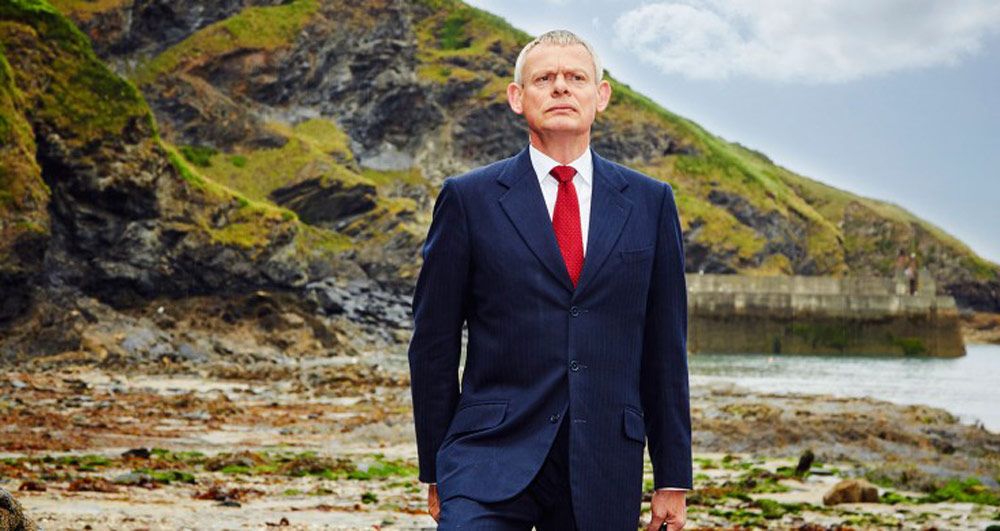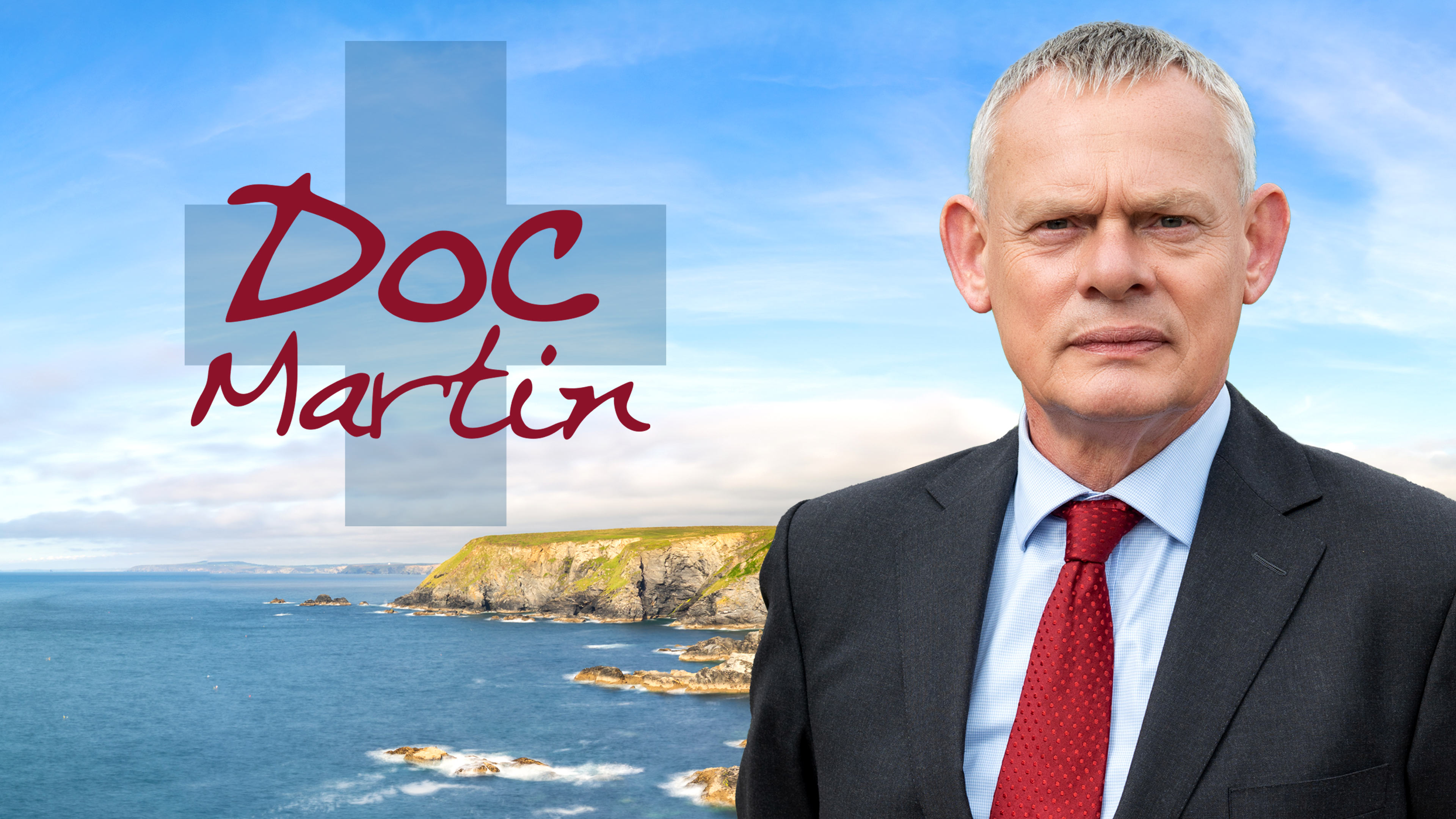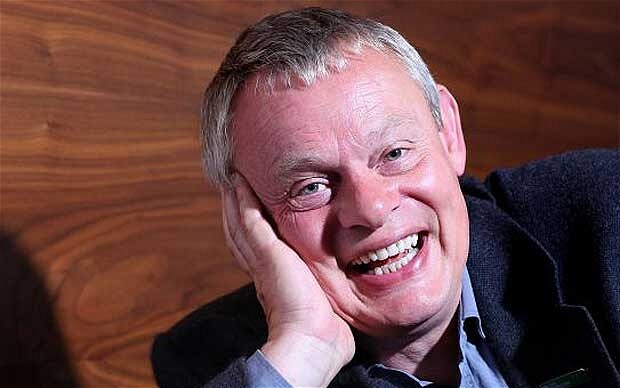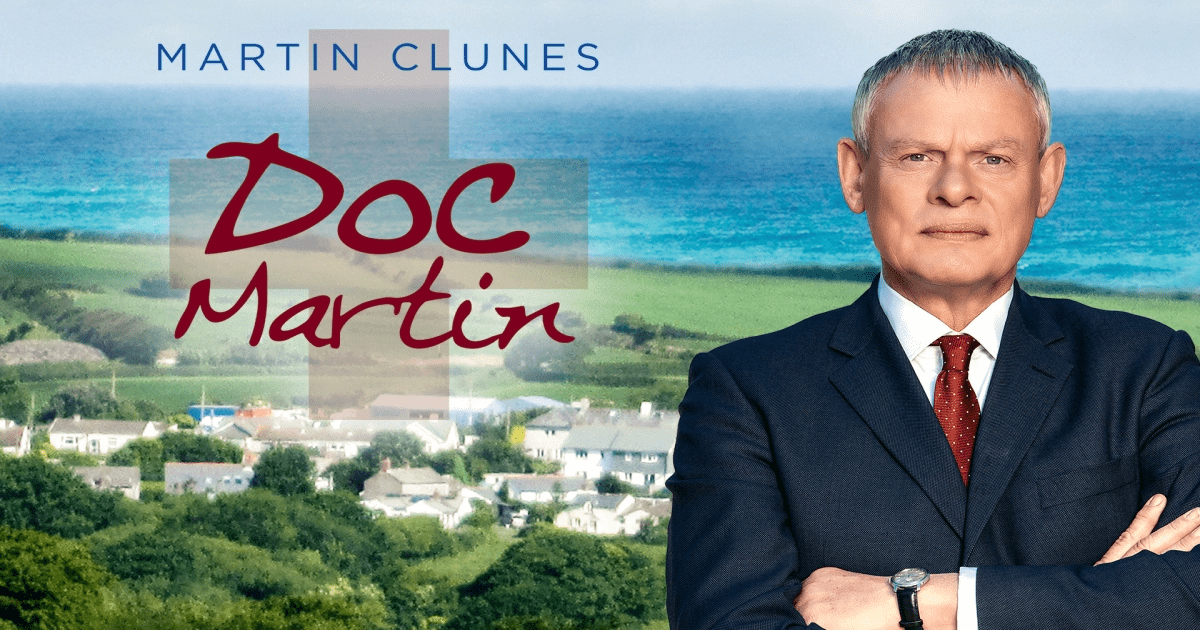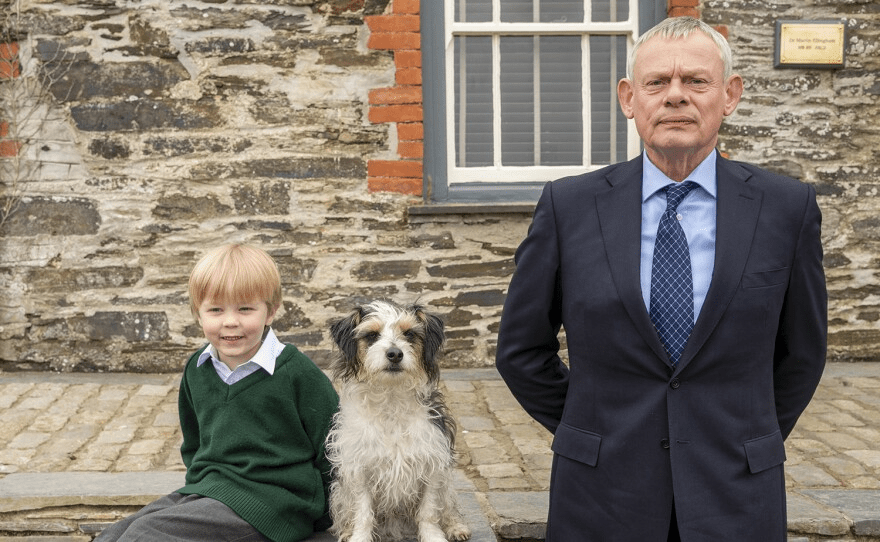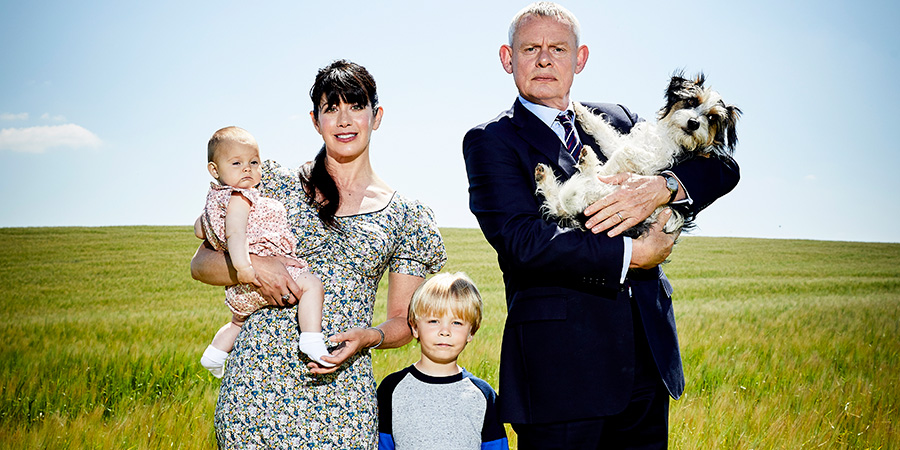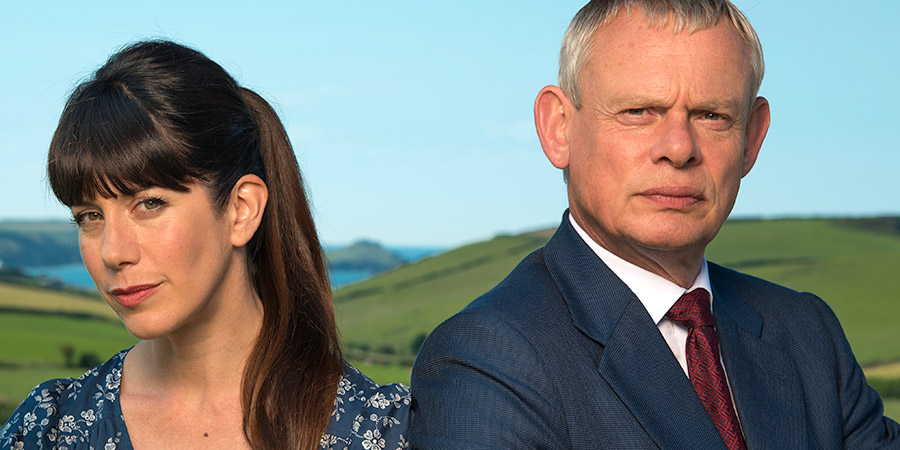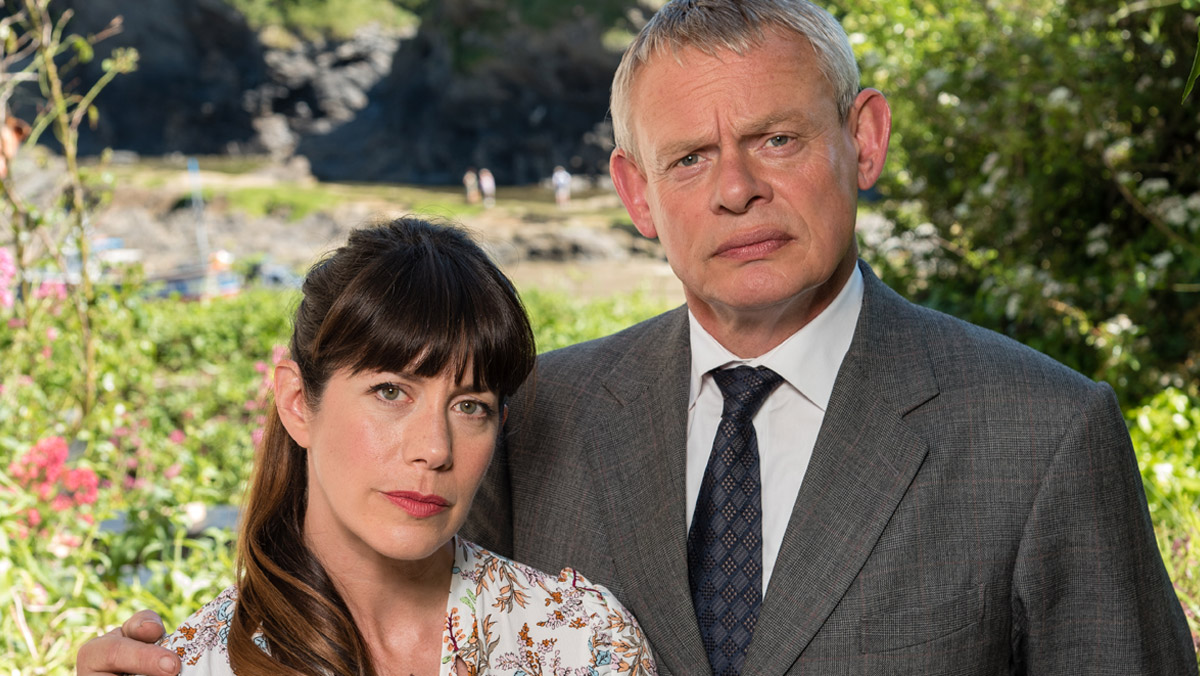Doc Martin is a British television comedy-drama series starring Martin Clunes as Dr Martin Ellingham, a highly successful vascular surgeon who suddenly develops a phobia of blood and is forced to give up his profession. He retrains as a general practitioner (GP) and takes up a new post as the doctor in the fictional seaside village of Portwenn in Cornwall, where the series is set. The show depicts Dr Ellingham's often clumsy interactions with the local villagers, who are eccentric and fiercely independent, providing plenty of comic tension. His personal life also comes under scrutiny, especially his on-off relationship with headmistress Louisa Glasson (Caroline Catz), with whom he has a son.
The TV programme Doc Martin first aired in 2004 on ITV in the UK and has aired nine seasons so far. It has become ITV's highest-rated drama series of the past decade and has received both BAFTA and National Television Award nominations. It is broadcast in many other countries around the world, gaining a large international fan base. The show is filmed on location in the picturesque fishing village of Port Isaac in Cornwall, which provides a stunning backdrop for the show. The village has become a prime tourist destination as fans flock there to experience the real-life Portwenn. Many locals appear as extras in the show as well. At the heart of the appeal of Doc Martin lies Martin Clunes’ brilliant comic performance as the curmudgeonly, socially inept doctor. His literal-mindedness and lack of empathy frequently land him in awkward situations, providing plenty of laugh-out-loud moments. Yet the character also shows his caring side when dealing with his patients’ illnesses.
1. How It Started - Doc Martin Origin Story
The initial spark of inspiration for Doc Martin came to creator Dominic Minghella after reflecting on the culture shock he experienced when moving from the small island community where he grew up to the bustling city of London. The extremes between close-knit rural village life compared to fast-paced urban anonymity gave him the idea to pitch a fish-out-of-water drama. Minghella envisioned a successful doctor or surgeon-type character forced to adjust from excelling in a top city hospital to becoming a general practitioner in a sleepy seaside town. This would enable funny clashes arising from the lead not understanding the traditional mindsets of local villagers. It would also allow moments of drama tackling universal experiences like parenting, relationships and mortality.
Fleshing out this concept, Minghella, along with co-writers Craig Ferguson and Mark Crowdy, developed the lead character of Dr Martin Ellingham - a brilliant vascular surgeon who suddenly develops haemophobia due to trauma around a patient bleeding to death. Martin struggles to overcome this phobia, forcing him to give up prestigious London work. The writers conceived Martin as prickly, blunt and permanently frustrated by disorder and inefficiency - the total opposite of cosy, friendly village doctors on other TV shows. Transplanting this cold fish surgeon to the fictional rural seaside town of Portwenn in Cornwall would drive plenty of comedic misunderstandings. But also allows for emotional growth in Martin via relationships with local teacher Louisa Glasson and eccentric villagers.
Producer Philippa Braithwaite helped refine story ideas, recognising the potential to sustain an ongoing drama series blending medicine, comedy and romance. She advised developing a back story around Martin’s parents - posh mother Margaret seemed friendly but was cruelly snobbish whilst husband Christopher was obsessed with amongst blood. This highlighted how Martin’s uptight persona and blood phobia originated. Minghella’s radio comedy writing experience meant he could create lots of humorous patient cases for Martin plus ensure the doctor's role remained authentic. Braithwaite input production expertise around filming in rural Cornwall locations which entire scripts were tailored around by Minghella and co-writers.
After the fish-out-of-water concept struck a chord with global audiences tuning in for nearly a decade of Doc Martin’s clashes with eccentric locals, Minghella’s initial vision for dramatising culture clash has proven a ratings phenomenon. Blending quirky neighbours, romantic turmoil and medicine into an idyllic coastal community ensured enduring, multi-generational appeal. The show fulfilled Minghella’s inspiration to craft universally relatable drama by exaggerating the extraordinary adjustment of moving between regional lifestyles.
2. The Challenge - Pitching The Show
Creators Dominic Minghella and Craig Ferguson developed the initial concept for a fish-out-of-water drama centring on a talented London surgeon who develops haemophobia, forcing him to retrain as a small village GP. Their original pitch played up the comic potential of his clumsy interactions with eccentric rural patients and neighbours. Producer Philippa Braithwaite helped attract interest from UK broadcaster ITV by recognising the show’s potential for medical storytelling combined with both humour and emotional depth. She met Minghella when looking to adapt another of his projects but they couldn’t get the rights. However, his idea for Doc Martin immediately stood out as a compelling concept.
What appealed to Braithwaite was the opportunity to challenge stereotypes around village doctors through lead character Dr Martin Ellingham, envisioned as prickly and permanently frustrated by the rural patients’ old-fashioned views. His complete lack of bedside manner would elicit plenty of laughs. Yet his professional integrity and knowledge would give the show dramatic weight when handling medical conditions. ITV could see Doc Martin’s potential to appeal especially to older mainstream viewers. Broadcasting executive Nick Elliott approved developing the pitch into a pilot episode given the universally relatable concept of patients visiting their family doctor. Blending this with both comedy and illness/well-being storylines offered engaging yet comforting viewing.
Creator Minghella’s early scripts fleshed out the lead character Martin and established his on/off flirtations with local teacher Louisa Glasson plus colourful neighbours like Bert Large. Producer Braithwaite praises Minghella’s natural flair for comedy dialogue while leaving room for dramatic plot development. His experience writing radio shows proved valuable in tailoring scripts specifically for lead actor Martin Clunes too. Clunes was Braithwaite’s perfect choice to embody Martin Ellingham’s complex persona - hilarious lack of empathy yet unleashing emotion in charged romantic scenes. His star profile was key to greenlighting full production but ITV executives were also impressed by early footage. The broadcaster proudly extended the show from a one-off film to a returning primetime drama series after the first episode became 2004’s highest-rated drama.
After nearly ten seasons and consolidated position as ITV’s most exported series worldwide, the Doc Martin concept has more than fulfilled its original pitch. Blending family doctor scenarios with brilliant performances eliciting belly laughs through to tear-jerking drama ensured enduring, multi-generational appeal spanning global audiences.
3. Reasons For Popularity - Doc Martin Cast
Finding the perfect actor to play the lead role of Dr Martin Ellingham was crucial to the show’s success. As created by Dominic Minghella, this curmudgeonly doctor had to elicit both laughs thanks to his clumsy bedside manner and social awkwardness, yet also make audiences care about him through moments of vulnerability and dedication to his patient’s wellbeing.
The producers sought an actor equally adept at comedy and portraying a complex, layered character across lengthy story arcs. Martin Clunes had first proven his talents for blending humour and heartfelt drama in the iconic sitcom Men Behaving Badly. His ability to elicit empathy for a flawed character was also demonstrated in William and Mary. Clunes’ rare versatility made him stand out during the casting process. His expressiveness and ability to convey a wealth of meaning through the slightest facial gestures or stammering pause showed he could make the doctor an instantly recognisable comedic creation. Producer Philippa Braithwaite praised Clunes’ “truthfulness as an actor” which meant “even in the most outrageous stories, Martin is believable.”
For the crucial role of Louisa Glasson, Doc Martin’s love interest, the producers sought an actress able to balance a playful warmth with the headstrong determination of her character - a woman not easily won over by the doctor’s clumsy charms. Caroline Catz has demonstrated her versatility across theatre, film and television roles ranging from period dramas to contemporary comedies. Catz’s ability to tap into the empathy, frustration and affection that Louisa feels towards the eccentric doctor gave their scenes an authentic dramatic tension. Yet she also showed a natural improvisational humour when reacting to Doc Martin’s bluntness with the village kids or parents. Off-camera Martin Clunes and Caroline Catz built an easy rapport that translated into endearing chemistry between their characters.
The producers were dedicated to finding actors who felt authentic rather than comedic caricatures. Casting director Jenny Hacker sought actors native to South West England who could bring regional authenticity. She discovered local Cornish fishermen and villagers like John Marquez who were passionate about getting involved. Their connections to Port Isaac add to the humour and heart.
Ian McNeice was invited to play wheeler-dealer Bert Large after working with Clunes and Catz previously. His brilliance for physical comedy and improvisation made him perfect for punctuating dramatic scenes. Selina Cadell portrayed the lonely Mrs Tishell who secretly pines for the oblivious Doc Martin. Her theatrical background brought hilarious melodramatic flair.
Tony Maudsley, Jessica Ransom, Eileen Atkins and Joe Absolom lead an exceptional ensemble cast over nine seasons. Their camaraderie amplifies the humour but also the empathy and realism viewers connected to, keeping audiences invested in Portwenn’s world. As Martin Clunes summarised, “We just have totally authentic and very good actors."
4. Location - Filming in Picturesque Port Isaac
Where is Doc Martin filmed? A crucial aspect of the show’s charm is the portrayal of Portwenn itself. Filming the series on location in the photogenic fishing village of Port Isaac in Cornwall adds enormous production value. The narrow winding streets, slate-roofed cottages huddled around a picturesque harbour, whitewashed exteriors with splashes of vibrant blooms, higgledy-piggledy arrangement of buildings on the cliffside....it all looks like a scene from a picture postcard.
Seeing the real Port Isaac on screen makes the village feel like a beloved character in its own right. It also adds believability, grounding the comedy and drama in a tangible place that viewers feel they too could visit one day. Fans make pilgrimages to Port Isaac to experience Doc Martin’s surgery, Bert’s restaurant, the village pub and other landmarks featured in the show. Inevitably though, the demands of filming an ongoing television series in a tiny community do cause difficulties. During the tourist season when crowds flock to see the Doc Martin sites, parking, traffic congestion, littering and shortage of amenities are all issues for residents. The production company works closely with the community to minimise disruption.
Locals also feature regularly as extras in crowd scenes and background shots. Keen audiences have even been able to spot the same characters recurring in episodes across multiple seasons, adding continuity. Various owners of the village pub have appeared in the show, while local fishermen have been seen pulling in their catches in harbour scenes. Seeing familiar faces enhances the viewer’s attachment to Portwenn and its salt-of-the-earth residents. It heightens the show’s exploration of community spirit, how long-term locals accept incomers and the importance of understanding each other’s foibles. Though most of the interior filming is done on a specially built set in a former aircraft hangar not far from Port Isaac, exterior shots make the most of the village’s winding alleyways, coastal paths and stone bridges.
Characters are often shown walking across the Platt and up Roscarrock Hill, overlooking the harbour. These locations around the village further emphasise the close-knit community always bumping into each other. Martin never quite manages to avoid his patients even during his off hours! The harbour, with its little fishing boats bobbing in the water, provides endless opportunities for tranquil establishing shots. Seagulls wheel overhead as the backdrop changes with Cornwall’s mercurial weather. Rough seas crash against the foot of the colourful cottages during winter storms.
5. Romance - The Central Romance Between the Doctor and Louisa
As lead actor Martin Clunes says, at the heart of Doc Martin’s appeal is the clash between “the coldest of cold fish, a man with no social skills or warmth, and normal people with normal problems in a beautiful place.” Setting the show in Cornwall accentuates this contrast between the doctor and the community. The county provides a visually stunning backdrop with its rugged coastline, isolated beaches, lush woods and rolling green fields. Yet it can also be a harsh environment for those who live there year-round, where making a living is tough. This enables storylines to show characters facing genuine hardships, giving depth and empathy to the comedy.
An anchor for many of the story arcs across all nine seasons has been Clunes’ on-screen relationship with Louisa Glasson, played wonderfully by Caroline Catz. Their rather awkward romance highlights Doc Martin’s difficulty reconciling his dedication to medicine and work with having an emotional connection to those around him. Louisa’s down-to-earth warmth balances Martin’s cold exterior, though their opposing natures also lead to tensions in their relationship. As head teacher of the local primary school, Louisa takes her duties of nurturing the village’s children very seriously, whereas Martin struggles to connect with child patients in his surgery.
Their slow-burn love story encapsulates the overarching theme of the show - can a big-city doctor adapt to life in a small community and open himself up to intimacy? Will the villagers accept an outsider? It’s a storyline that resonates with many viewers who have relocated from urban to rural areas. The ensemble supporting cast is crucial to bringing Portwenn and its array of eccentric locals to life. Eileen Atkins is brilliant as Doc Martin’s formidable Aunt Ruth who becomes an unlikely mentor to him. Though blunt and direct, she understands the villagers better than Martin and helps guide him.
Ian McNeice provides great comic relief as local businessman Bert Large, whose various money-making schemes all seem to go wrong. He’s usually found hatching his latest plan at the village pub alongside his wayward son Al, played wonderfully by Joe Absolom. Then there are the colourful townsfolk who frequent Doc Martin’s surgery, played by an excellent roster of guest stars and local actors adding authenticity. They portray the everyday health complaints that most people endure, bringing warmth and humour to the drama.
6. The Doctor's Journey- Developing the Doc Martin Character
But the lasting legacy of Doc Martin lies less in its undeniably gorgeous Cornish setting and more in its development of a memorable lead character whom audiences have come to love over nearly ten seasons. Writer Dominic Minghella gradually revealed facets of the Doc’s background and personality through encounters with his patients and relationships old and new. Bit by bit, the layers get peeled back on why this highly skilled doctor struggles to connect with people and often seems so curmudgeonly.
Doc Martin’s parents Christopher and Margaret featured in various episodes, giving climbs into his unhappy childhood. Scenes of Martin’s mother sniping sarcastically at her husband and son highlighted where Doc’s bluntness originated. Yet she also defended her son’s medical career choice when her husband declared Martin wasn’t intelligent enough to become a surgeon. Through confrontations with patients and run-ins with the bureaucratic health authorities, viewers see Martin’s unbending adherence to duty of care and medical ethics. Though his people skills may be lacking, his professional integrity and knowledge are faultless. His medical opinion is frequently at odds with the old-fashioned ways of village life in Portwenn, creating humorous culture clashes around issues like antibiotics overuse and vaccines. Doc sees relying on traditional remedies as irresponsible superstition, although occasionally he does have to acknowledge Eastern therapies to have efficacy!
Martin’s clash with the more touchy-feely methods of Portwenn’s other GP, Dr Dibbs, beautifully encapsulates this tension between rural tradition and evidence-based modernity. Their heated interactions highlight Martin’s exasperation with the failings of country doctors compared to city physician rigour. Yet slowly we realise that though Martin disapproves of the villagers’ lifestyles, he seems to admire their sense of community. Surrounded by squabbling families, men struggling to provide for their partners, and parents sacrificing for children....the Doc begins to appreciate that intimacy requires work but brings meaning.
Through wrangles with the eccentric local characters played brilliantly by stalwarts like Ian McNeice and Joe Absolom, we get entertaining insights into Martin’s frustrations but also his protective loyalty towards the villagers. Bit by bit, Portwenn and its residents thaw Martin’s frosty exterior. The growth in his relationship with Louisa Glasson forms the emotional anchor point for viewers. We desperately root for Martin to overcome his awkwardness and connect more meaningfully with Louisa. When he invites Louisa to dinner in his kitchen and tries ardently to make conversation, we melt! Their on-off romance captures audiences for nearly ten seasons because we’ve come to invest in Martin as a character worth rooting for. All credit goes to Martin Clunes’ superb ability to portray Martin’s complexities - the sincere humanity beneath the curmudgeonly exterior.

Let us know you agree to cookies
We use marketing, analytical and functional cookies as well as similar technologies to give you the best experience. Third parties, including social media platforms, often place tracking cookies on our site to show you personalised adverts outside of our website.
We store your cookie preferences for two years and you can edit your preferences via ‘manage cookies’ or through the cookie policy at the bottom of every page. For more information, please see our cookie policy.

